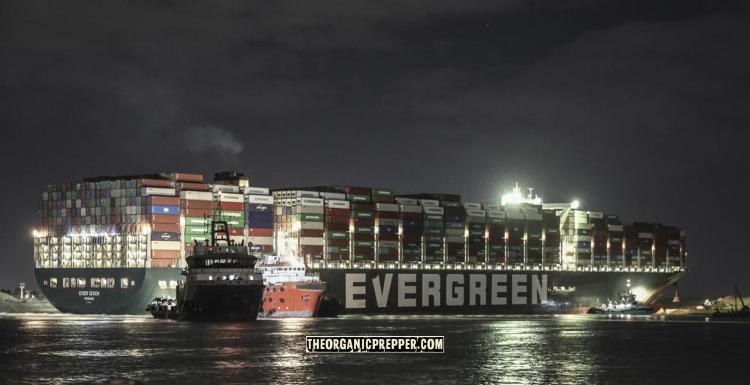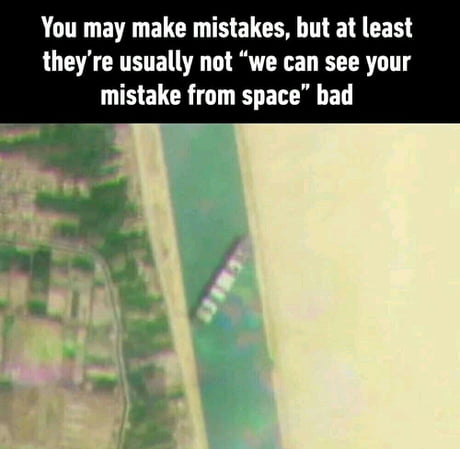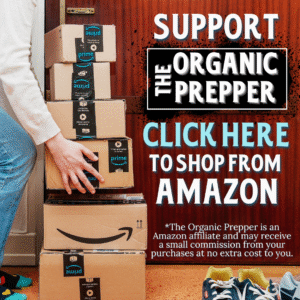If you're new here, you may want to subscribe to my RSS feed. Thanks for visiting!
As of right now, the Suez Canal blockage seems only to be a human interest story. Some readers watching the story of the grounded sky-scraper-sized Ever Given container ship may find it comical and curious. Surely you’ve seen the many memes circling the internet?
Only a few understand the ramifications if the vessel isn’t dug out and freed very soon. But the Suez Canal blockage could very well become an issue at the checkout counter.
UPDATE: The canal has reopened at 10 this morning after being blocked for nearly a week. Hundreds of vessels remain backed up and passage will hopefully resume later today. Due to the massive delays and just-in-time shipping, the facts of the article remain pertinent.
Lloyd’s List has estimated the wait is costing about $9.6 billion per day
Before the Ever Given ship was grounded, approximately 50 vessels a day sailed through the narrow Suez Canal, which amounts to roughly 10% of global trade. These vessels carried everything from electronics to chemicals, ore, petroleum, and food.
With the ship being lodged sideways in the canal, there are virtually no alternative routes for shipping goods from Asia to Europe. Much of that cargo is simply sitting idle. It is either currently waiting to cross the canal or stuck in port. Owners and shippers are left wondering what to do. Do they place bets the channel will reopen soon? Or choose more costly and time-consuming alternatives?
Potential severe ramifications for the supply chain are looming
Because of the lockdowns, restrictions, and shutdowns related to COVID, global supply chains are already reeling.
“This is just one more challenge to the supply chain operations that we’re seeing across the board,” Jonathan Gold, Vice President for supply chain and customs policy with the National Retail Federation, said. “[We are] already seeing congestion and other things impacting the supply chain. This is one more thing that adds to that.”
A prolonged shutdown in Suez will only amplify those troubles. Europe would suffer the most significant blow as it relies mainly on transfers through the canal. But, given the unfortunate globalized economy, the United States will feel the effects as well.
What do companies caught in the congestion have to say?
Jennifer Bisceglie, an expert in global supply chain resilience and founder and CEO of Interos Inc., believes that it’s time for companies to consider “having more disparate [supply hubs] instead of having all our eggs on one cargo ship.”
“These things can’t be looked at discretely,” said Bisceglie. “Last year, you had this big wake-up call of the concentration risks of the physical supply chain from COVID, and then you had this on top of it.”
Maersk told NPR that it was not committing to rerouting any of their ships at this time because it was too early to do so.
The company stated, “while out of our control, we apologize for the inconvenience this incident may cause to your business and for critical shipments.”
“[We] recommend that you reach out to your local sales representative for dialogues and quotations on alternative solutions, such as air and rail for urgent cargo that is still at origin or elsewhere,” it said.
What will this mean for the cost of shipping, operating costs, and oil prices?
Mostly, it will depend on how long the ship remains stuck and how quickly the other ships can catch up on their deliveries.
“[A] few days might not have a meaningful impact,” said John Kartsonas of Breakwave Advisors, a company that specializes in asset management and advisory services for the shipping and commodities industries. But he added that if the situation takes weeks to resolve, it is likely shipping rates will start to climb. More days at sea means ships are burning more fuel. That means operating costs will also start to rise.
Jonathan Roach, a container market analyst for Braemar ACM Shipbroking told NPR:
“The large container ships, the super, mega-max container ships, can burn 100 [to] 150 tons of fuel a day,” Braemar ACM Shipbroking’s Roach told NPR.
That’s $80,000 a day in fuel and an extra 10 days travel time — both to and from Asia. “So, you’re looking at the best part of a million dollars with your operating costs. So it’s a million dollars out and a million dollars back,” he said.
In his letter to clients, Roach also noted problems at the Suez Canal could disrupt the flow of containers. A trade imbalance between Europe and Asia means that filled containers going west return mostly empty to ports in the east to be refilled. “If empty stocks dwindle in Asia, there is the short-term possibility of an increase” in prices, Roach wrote.
Insurance is another consideration. If costs are passed on to the insurers, the insurers will respond with a spike in insurance premiums and thus an ultimate increase in consumer prices. Oil prices are also of great concern. Shipping rates for petroleum products have nearly doubled since Ever Given’s grounding.
Patrick De Haan, the head of petroleum analysis at GasBuddy explains the possible impact on fuel prices:
“If the Suez Canal remains blocked for more than a few more days or over a week, we could likely see some disruptions in oil flows between the Middle East and Europe that could impact price globally,” said Patrick De Haan, the head of petroleum analysis at GasBuddy.
“But it should not hamper flows of oil to North America,” De Haan said. “At worst, if the issue continues, if oil prices do see a sustained rally, the blockage could have a small and limited impact on gas prices, likely no more than a few cents per gallon on average.”
Are you ready for excessively high costs for just about everything?
Currently, Americans are living with limited options. The strain on the supply chain is showing up in grocery stores, clothing stores, hardware stores, appliance stores, and places like Walmart and Target. The mainstream is already warning of another impending toilet paper apocalypse (Get prepared with these alternatives.) Now, add the Ever Green grounding and globally, we will likely see the cost of fuel prohibitively high. We may also see the price of small luxury items and food so high only those who have benefited from globalization and the world oligarchical system will be able to afford them.
Are you stocking up on anything in particular in response to the Suez Canal crisis? Do you foresee any particular issues that others may not have considered? Let’s talk about it in the comments.
About Robert
Robert Wheeler has been quietly researching world events for two decades. After witnessing the global network of NGOs and several ‘Revolutions’ they engineered in a number of different countries, Wheeler began analyzing current events through these lenses.

















26 Responses
It’s got about a million shipping containers tied up. It’s got animals like cattle that will be running outta food/water soon.
It’ll definitely make a squeeze or two in the shipping accordion which was already playing a tune.
It shows just how vulnerable these canals are.
Well it’s back open now
Suez Canal reopened after Ever Given ship successfully refloated
https://www.nbcnews.com/news/world/suez-canal-ship-ever-given-partially-refloated-after-huge-effort-n1262299
Thank you!I’ve updated the article with this information.
IceAge Farmer thought this fiasco was intentional. Maybe so? Because of the global financial crisis and debt, inflation must be created. It’s tough to create inflation, but not so tough to create shortages which lead to inflation.
“Maybe so?”
definitely so. some teenage geek hacker somewhere got into the systems and thought he was so clever messing with the controls. probably getting swatted right now, be watched the rest of his life, probably wind up working for the pentagon on cyberwarfare stuff.
Dream job? Pot? Kettle? Bueller?
Although this was a problem and probably will be again sometime in the future either in the Suez or Panama canal, it is not catastrophic.
These things occur and we should not take Chicken Little approach to them.
.All to many times we react ,after an event occurs and we expect to see the worst resulting from it.
The canal has been closed to traffic at least 5 times since its opening and one of those closings lasted for 8 long years (during the Egypt, Israeli war starting in 1967). This time it was only for about a week.
So taken in perspective, it is not that big of a deal.
It does point to the problems inherent with relying on production, rather than on warehousing to meet inventory requirements, but that is a whole different issue. These ideas also come and go.
Just like the idea that employees were dispensable and easily replaced. Until corporations started counting the costs of retraining the new employees and the lost efficiency in regards to high turnover rates. Then that economic concept also lost its appeal and was cast aside, as this one probably will eventually also be cast aside.
“it is not catastrophic”
dude, don’t be a buzz-kill.
“we should not take Chicken Little approach”
apocalypse denier!
Calm down, son. Its just a fucking boat.
I think Walmart might be running out of large boxes for shipping items. I ordered 2 packages of Scott toilet paper – the 20 roll package. One of them was shipped not in a box, but with just a shipping label on it. The other one was put into a box by FedEx because it had broken open. This one also had the shipping label on the original wrapping.
This is the first time that toilet paper from Walmart has been shipped like this. It had always come in a box. The plastic wrapping is not that thick or strong to withstand handling by any shipping company.
Weird…not a good sign.
To me, this incident’s a wake up call. It also illustrates how fragile the canals are. What if this had occurred in the Panama Canal? I guarantee Americans would have felt the impact within days.
If you haven’t stocked up on essentials, you better get the ball rolling pronto.
For me, this reaffirms something I figured out about a year ago: our civilization is too global for resilience. We need to localize as much as we can. Support your local brick-and-mortar stores, buy locally grown and locally produced when you can, and start a garden this year. Get to know your neighbors.
These things have costs, but you will be safer.
“These things have costs”
’bout double. or more.
“you will be safer”
… well the local overall survival rate for somebody will increase long-term, but don’t expect that that necessarily will benefit you yourself.
The problem isn’t just ships backing up. China is hording shipping containers so less material can be shipped in the first place. For example, Brazil has massive amounts of pulp available to send to North America for paper products (think toilet paper), but without shipping containers to get it here we will be facing another paper products shortage. There is also a massive shortage of building supplies. I’ve heard it said that by July no one will be able to have any work done on their homes. That’s an entire industry that’s going to go down, plus the ripple effect through a multitude of related industries.
” That’s an entire industry that’s going to go down”
sell the house for triple, live in an rv ….
Move out of your mother’s basement. Rv…
Too many empty containers at the wrong spot. Since the US main exports are weapons of war and financial fraud, China doesn’t need or want either. The US used to fill those empty shipping containers with scrap for China to recycle…now China doesn’t even accept that. So China now pays to have the containers shipped back empty. The US makes very little China wants or needs.
Sad…
According to Felix Richter at Statista, due to globalization, the demand of container shipping has grown, nearly eight fold since 1990: https://www.statista.com/chart/24527/total-volume-of-global-sea-trade/
Also according to Statista, 4.6m barrels of oil transits through the Suez Canal on a daily basis. https://www.statista.com/chart/18109/seaborne-oil-transiting-possible-chokepoints/
The disruptions that can be caused by a shutdown of a major chokepoint (or bottle neck if you prefer) can be felt far and wide.
I’ve always been concerned that something would interrupt the shipping of goods, both on a local as well as ia national and international basis. ‘Just In Time’ deliveries is only one aspect of the problem. There are choke points like this in a lot of places. Gibraltar comes to mind. It is just 8.9 miles wide and could easily be shut. The Panama Canal is another. Damaging just one lock would stall traffic for years. The world’s economies hang on a delicate thread.
Hard to envision that many items will be affected in the US as most of this backed up traffic was going to Europe but you can’t discount anything lately. My own preps are what they always are: keep the essentials stocked up and devote any left over funds to more discretionary items. My area in SE WI has very few food or household items shortages at this point. Shelves are pretty full no matter which store I shop at.
Just by luck of the draw today, Modern Marvels was playing the story of the building of the Suez canal..
Quite a coincidence. Actually a good show.
Interestingly
We gave the terrorists a new, really impactful target choice, much closer to their home.
Just saying
Keep preparing and stay safe
If you’ve ever lived on an island somewhat remote from the mainland, a phrase you might hear when you ask your local storekeeper for something is, “Next Boat.”
That phrase usually signals inconvenience and delay even when the boats are running on schedule, so you are wise to keep a few extra of anything you actually need, even during goid times.
Why do you and others insist on calling that ship Ever Given and I think another similar phrase, when it is clearly named EVERGREEN?
The company is evergreen, the ship is Ever given.